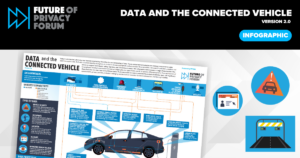New Report Explores Privacy Implications of Driver Safety Systems
Report Offers Recommendations for Organizations Developing, Implementing, and Regulating Technologies
Today, the Future of Privacy Forum (FPF) is releasing a new report explaining how safeguarding driver privacy and data protection will be critical to ensuring widespread acceptance of new safety technology in vehicles. This report comes as the National Highway Traffic Safety Administration (NHTSA) is in the process of establishing new requirements for safety technology that vehicle manufacturers will soon integrate into vehicles of the future.
FPF’s report explores the privacy implications of vehicle safety systems – including Advanced Driver Assistance Systems (ADAS) and Driver Monitoring Systems (DMS) – and impairment detection technologies, which use automated technology to enhance vehicle safety. In addition to core recommendations for public and private entities developing and enforcing these technologies, the report includes insights from a survey completed with the Automotive Coalition for Traffic Safety, which gauges individuals’ attitudes toward the use of Vehicle Safety Systems and explores how to prioritize privacy.
“Vehicle safety systems can save lives and reduce injuries–but only if people use them. Policy makers and auto manufacturers must consider the privacy and data protection implications for all drivers when incorporating new technology into vehicles to bolster driver trust and adoption.”
Adonne Washington, Policy Counsel of Data, Mobility, and Location
The 2021 Infrastructure Investment and Jobs Act requires NHTSA to establish a new Federal Motor Vehicle Safety Standard surrounding impaired driving technology. In response, the report identifies five core recommendations for organizations developing, implementing, and regulating these technologies:
- Regulators, technology developers, and technology deployers should ensure that privacy is a foundational principle for any Vehicle Safety System and should implement appropriate legal, policy, and technical safeguards when personal information is implicated, including measures that:
- Technology developers and technology deployers should de-identify data collected by Vehicle Safety Systems as appropriate.
- Impairment-detection systems should be accurate, should be tested for potential bias, and should not produce false-positive results more often for people from underrepresented, marginalized, and multimarginalized communities. Well-defined standards for consistent deployment and alignment across the industry may be beneficial.
- Driver acceptance should be promoted through transparency about Vehicle Safety Systems functions and operations, as well as the handling of personal data.
- Regulators, technology developers, and technology deployers should identify and mitigate, to the extent possible, potential future harms to drivers, especially to people from underrepresented, marginalized, and multimarginalized communities.
The survey results informed the recommendations. The key findings from the survey revealed that many individuals value advanced vehicle safety technologies but worry about the privacy risks, accuracy of the technology, cost, and data transfers to third parties. Additionally, individuals indicated that they generally trust carmakers’ data practices more than online companies and the government but worry about vehicle systems that collect information about occupant behaviors. Individuals want to incorporate these technologies for safety but need privacy and data protection practices like disclosure limits, encryption, on-car storage, and de-identification to trust these systems.
“Ensuring privacy protections in vehicles is necessary. Privacy protections can’t be considered at the end of the process when developing technology and shouldn’t be considered in a vacuum, but rather privacy should be continually considered in regard not only to every stage of the development pipeline but also to any unique risks for marginalized or multimarginalized individuals and communities.”
Adonne Washington, Policy Counsel of Data, Mobility, and Location
The report examines the strategies needed to protect consumer privacy when technologies, especially those to detect impairment, are included in vehicles. Washington underscored that policy leaders, regulators, and automakers should use the resources published to better understand drivers’ knowledge of data collection and safety systems in and around new and advanced vehicles.
FPF will also host a panel discussion and reception on the report. Learn more about the event here.



